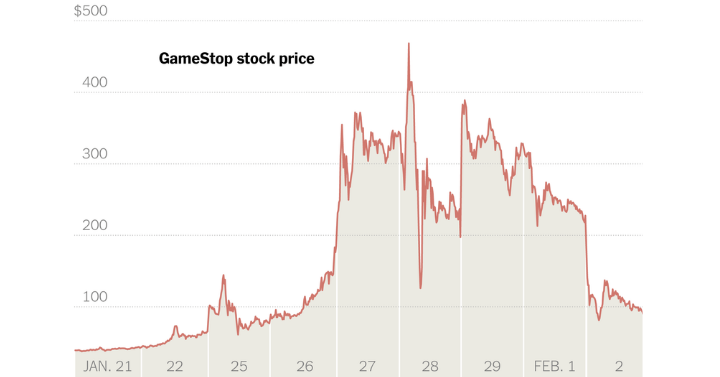- Reading time: 3 mins 15 secs
Tutto è iniziato quando i fan di GameStop lo hanno identificato le istituzioni stavano manipolando le azioni della catena vendendo più short con leva finanziaria rispetto alle azioni disponibili. Hanno deciso di reagire spingendo al rialzo il prezzo delle azioni.
Alcuni dei rivenditori coinvolti hanno finito per realizzare profitti milionari, prima di ciò il costo medio delle azioni GameStop era di $20 e arrivava fino a $450. Una delle istituzioni coinvolte nella manipolazione del mercato ha dovuto essere salvata per diversi miliardi di dollari.
Anche se riteniamo che le istituzioni abbiano sbagliato nella loro manipolazione, riteniamo preoccupante la mancanza di strategia utilizzata per reagire. Uno dei nostri insegnamenti fondamentali di Investment Mastery è non lasciare che le emozioni entrino in gioco investimenti commerciali, molti trader hanno subito perdite importanti perché sono stati governati dal cuore, non dalla testa. Sarebbe interessante conoscere le persone che sono state coinvolte...
...qual era la loro strategia?
Il risultato era sempre quello di sentirsi vendicati nella loro causa o stavano cercando di fare soldi? Per noi, questo ha elementi di uno schema Ponzi. Molte persone sono state incoraggiate a iscriversi tramite forum online come Reddit e scommetteremmo che coloro che hanno incoraggiato altri hanno già investito.
Più persone entrano, più alto sarà il prezzo e maggiore sarà il profitto che otterranno.
Molti credono che la chiave per fare trading e investire sia quando entrare, ma in realtà è quando uscire. Osservando il grafico di GameStop, puoi vedere le persone entrare e spingere il prezzo verso l'alto, ma ciò che non riusciamo a identificare è una chiara strategia di uscita.

(Credito fotografico: NYTimes.com)
Dal rialzo, ha registrato un gap proprio e il titolo è sceso a circa $60, che prevediamo scenderà ancora più in basso. Con il calo del valore delle azioni, coloro che sono entrati nella fascia alta rischiano di perdere molti soldi. Qualcuno trarrà profitto da questo e sono le persone a far scendere il prezzo. Sono le istituzioni che, ancora una volta, stanno manipolando le azioni e facendone scendere il prezzo. Questa manipolazione ha costretto le persone ad abbandonare le loro posizioni long e a vendere a prezzi stupidi.
Questo per noi dice che c'era nessuna strategia di uscita in atto o alcuna strategia. Quando si entra nel mercato, ci sono 4 cose da tenere in considerazione:
- Quando entrare
- A che prezzo entrare?
- Quando uscire
- Quanti soldi investire
Lets apply this to the Game Stop scenario…
- Dove entrare – Prima di acquistare azioni, esamina sempre i fondamentali della società. Con la pandemia globale, GameStop, in quanto rivenditore non essenziale, non dispone di buoni fondamentali. Questa è una vendita allo scoperto, utilizzata per aggiungere liquidità al mercato. Ciò impedisce anche l'esuberanza mostrata nel grafico GameStop.
- A che prezzo entrare? – Il prezzo per entrare era $20 ma il grafico mostra che le persone stavano ancora acquistando quando era a $450. Osservando i fondamentali dell'azienda e i prezzi precedenti, l'azienda non valeva tanto, quindi perché le persone continuano a comprare quando stava raggiungendo questo prezzo astronomico?
- Quando uscire – Per assicurarti di avere il controllo, dovresti disporre di uno stop-loss per garantire perdite e rischi minimi. Non sembra esserci un punto in cui le persone uscissero.
- Quanti soldi investire – La nostra regola è di non rischiare mai più di 1% del proprio portafoglio, quindi sarebbe interessante sapere quante persone hanno investito e quali % del loro portafoglio hanno rischiato in questo.
Diremmo che è troppo presto per prevedere cosa accadrà, ma le ripercussioni di ciò potrebbero essere minori vendite allo scoperto sul mercato, il che sarebbe un errore. Non è la vendita allo scoperto che spinge il prezzo verso il basso, è semplicemente la vendita. Le persone che sono entrate intorno alla soglia $20 e poi sono uscite, sì, le istituzioni hanno inserito e venduto allo scoperto, ma molte persone semplicemente sono semplicemente uscite.
Sarebbe interessante sentire le persone che hanno guadagnato da questo e se avevano una strategia. Osservando il grafico e vedendo le conversazioni sui forum, sembrerebbe che molte persone si siano unite per far parte del movimento, ma fare trading con le emozioni al centro è un gioco pericoloso.



